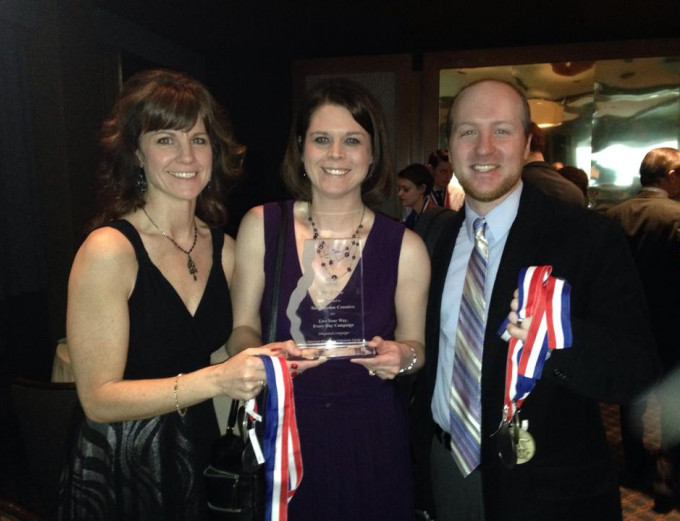Cringe-Worthy Words
by New Boston on March 15, 2012
In college, I had a roommate who absolutely, unequivocally hated the word “moist.” Whenever someone uttered it, you could practically see a shiver of disgust run its way down her body, her eyes closing from the mere sound of the word leaving someone’s lips.
And she’s not the only person I’ve met who can’t stand that word. I’ve heard others mention it in passing, or when the word comes up in conversation. There’s even an episode of “How I Met Your Mother” where we learn that Lily hates the word “moist,” and Barney proceeds to rent a theater, invite his friends, and — for the first 40 minutes of his performance — simply repeat the word “moist” over and over…and over.
We’ve all got them: words we simply cannot abide. As a language geek, I have more than most. But my former roommate was a numbers girl, and she, too, had words that set her off. Of course, her words weren’t the same as mine…because we all have our own set. “Moist” has never bothered me; I find it to be a perfectly lovely, descriptive word. But I do have grudges against “literally” (which is almost never used correctly), “pus” (self-explanatory), “ornery” (you can either enunciate it and feel silly, or say it fast and sound French), “duty” (hearing this word spoken aloud brings out my inner 9-year-old boy), and “palatable” (no reason, really; I just feel like a jerk when I say it).
When it comes to business and marketing language, there are other words that make me cringe — and several of them bother my coworkers as well. Our feelings about these words stem from several things: their overuse, their misuse, or their pretentious feel. But in almost every case, these words are rampant in marketing and advertising. Here are a few:
Utilize: This word pops up regularly in business materials — mainly, I think, because people think it sounds impressive. But in this office, we almost always substitute the word “use”; it’s shorter, simpler, and every bit as effective. Plus, it doesn’t sound as snobby.
Solutions: I have lost track of how many businesses are using this word either as part of their company name or as part of their tagline. I get the idea behind it: Consumers have problems, and you have a solution to their problems. It’s a good business model. But in terms of a tagline or business description, it’s really vague to say you offer solutions. Generally, we try to focus on more specific positive outcomes — how your life will be better/easier/less costly if you buy a product from or work with a certain company.
Needs: I see this word most often in local advertising (specifically in taglines). It usually goes something like this: “For all your dog-walking needs.” “For all your frozen-yogurt needs.” “For all your black-market diamond needs.” Eons ago, some business owner whipped up this phrase, and, boy, did it stick. You hear it so many times that you internalize it. Hell, I’ve probably even typed it out once or twice during my workday before backspacing with shame. My problem with “needs” in a tagline is that it basically just tells people what your business does, whether it’s child care or restaurant supply. But, in most cases, your business name already does that, making your tagline redundant. You want your marketing (and especially your tagline) to communicate not just what you do, but what you do better than every other dog walker, frozen-yogurt seller, or black-market diamond provider out there.
Unique: The term “unique” is overused, and it’s often used incorrectly. It actually means “one of a kind,” but people mostly use it when they mean “rare.” That misuse aside, the second issue is this: Saying that you’re one of a kind or different doesn’t get to the heart of why people should hire you, or buy your service or product. Don’t say that you’re better; say why you’re better.
My: Placing “my” in front of a business name is a recent(ish) trend I’ve noticed in many national commercials. In fact, I can think of four I have seen lately: My CVS; My Tide; My Jenny (as in Jenny Craig); and My Moment, My Dove. I think this trend has grown from companies being anxious to leap into the social networking era — when you’re supposed to “join the conversation” and give customers ownership of your product. And, honestly, I think it’s also a lingering effect of the incredibly popular I’m a Mac, I’m a PC commercials Apple did several years back. It’s about inspiring brand loyalty. It’s a smart idea, but it’s everywhere.
Regardless of why these words bother me (and other New Bostonians), the thing they have in common is that they’re widespread in marketing campaigns these days. And the main reason they appear over and over is because people get used to seeing them, and they (knowingly or not) repeat the words when it’s time to explain their own business (or their marketing companies do).
From a business perspective, though, you want marketing to help make your brand stand out — to show what’s different and special about it. If you’re using the same words and language everyone else uses, how are you going to get noticed? How are you going to make your message something other than white noise alongside the rest of the “unique” businesses that offer “solutions” and ways to fulfill customers’ “needs”?
Different words bother different folks. I’ve no doubt that some of these words are just fine with you, while others drive you crazy. Which words set you off, either in advertising or just in general?





